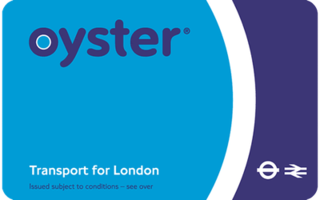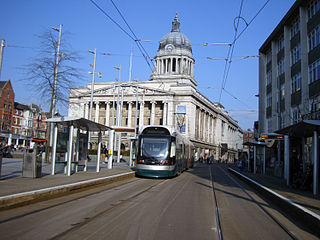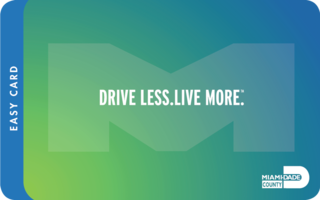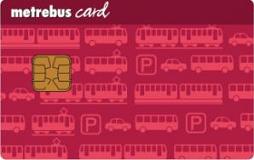Related Research Articles

The Oyster card is a payment method for public transport in London, England, United Kingdom. A standard Oyster card is a blue credit-card-sized stored-value contactless smart card. It is promoted by Transport for London (TfL) and can be used on as part of London's integrated transport network on travel modes including London Buses, London Underground, the Docklands Light Railway (DLR), London Overground, Tramlink, some river boat services, and most National Rail services within the London fare zones. Since its introduction in June 2003, more than 86 million cards have been used.

The Travelcard is an inter-modal travel ticket for unlimited use on the London Underground, London Overground, Elizabeth line, Docklands Light Railway, London Trams, London Buses and National Rail services in the Greater London area. Travelcards can be purchased for a period of time varying from one day to a year, from Transport for London, National Rail and their agents. Depending on where it is purchased, and the length of validity, a Travelcard is either printed on a paper ticket with a magnetic stripe or encoded onto an Oyster card, Transport for London's contactless electronic smart card, or an ITSO smartcard issued by a National Rail train operating company. The cost of a Travelcard is determined by the area it covers and, for this purpose, London is divided into a number of fare zones. The Travelcard season ticket for unlimited travel on London Buses and the London Underground was launched on 22 May 1983 by London Transport. One Day Travelcards and validity on other transport modes were added from 1984 onwards. The introduction of the Travelcard caused an increase in patronage and reduced the number of tickets that needed to be purchased by passengers.

The EasyCard is a contactless smartcard system operated by the EasyCard Corporation, which was previously named the "Taipei Smart Card Corporation", for payment on the Taipei Metro, buses, and other public transport services in Taipei since June 2002, and its usage has since expanded to multiple kinds of businesses. Its use has also since been expanded to include convenience stores, department stores, supermarkets, taxis, and other retailers since 1 April 2010. Like conventional electronic fare systems, the card employs RFID technology to operate without physical contact. They are available for purchase at all Metro stations and all chain convenience stores.
SmartRider is the contactless electronic ticketing system of the Public Transport Authority of Western Australia. The system uses RFID smartcard technology to process public transport fares across public bus, train, and ferry services.

Cardiff Bus is the main operator of bus services in Cardiff, Wales and the surrounding area, including Barry and Penarth. The company is wholly owned by Cardiff Council and is one of the few municipal bus companies to remain in council ownership.
The Chicago Card and the Chicago Card Plus were contactless smart cards used by riders of the Chicago Transit Authority (CTA) and Pace to electronically pay for bus and train fares in the city of Chicago, Illinois, USA and the surrounding suburbs. On June 1, 2014, CTA and Pace stopped accepting these cards as part of a transition to Ventra.

Myki, stylised as myki, is a reloadable credit card-sized contactless smart card ticketing system used for electronic payment of fares on most public transport services in Melbourne and regional Victoria, Australia. Myki replaced the Metcard ticketing system and became fully operational at the end of 2012.

get me there is an electronic ticketing scheme under development by Transport for Greater Manchester (TfGM) for use on public transport services in Greater Manchester, England. It was first announced and confirmed as an integrated travel card, comparable to London's Oyster card, for Greater Manchester in June 2012, following a bid from the Greater Manchester Combined Authority.

A transit pass or travel card, often referred to as a bus pass or train pass etc., is a ticket that allows a passenger of the service to take either a certain number of pre-purchased trips or unlimited trips within a fixed period of time.
The go card is an electronic smartcard ticketing system developed by Cubic Corporation, which is currently used on the Translink public transport network in South East Queensland, Australia. To use the go card, users hold the card less than 10 cm away from the reader to "touch on" before starting a journey, and must do the same to "touch off" the service at the end of the journey. The cost of each journey is deducted from the go card balance.

Nottingham is the seventh largest conurbation in the United Kingdom; despite this, the city's transport system was deemed to be poor for its size in the 1980s. In the early twenty-first century, the UK government invested heavily in the transport network of Nottingham, which has led to the re-opening of the Robin Hood Line and the construction of a light rail system, Nottingham Express Transit.

Iff card is a contactless smart card introduced in Cardiff in 2010. It allows customers to travel on Cardiff Bus services after having pre-paid.

The Easy Card is a contactless smartcard system for public transit fares in the Miami metropolitan area. The Easy Card is valid on Metrobus and Metrorail services in Miami-Dade County, and on Tri-Rail services throughout the region. Easy Card payments were introduced in 2009 on Miami-Dade Transit services, and expanded to Tri-Rail in 2011. The card functions as a stored-value card, and can also be loaded with unlimited-ride passes. Reduced-fare and zero-fare versions of the Easy Card are available for eligible customers, including seniors and individuals with disabilities.

Opal is a contactless smartcard fare collection system for public transport services in the greater Sydney area and most other urban areas of New South Wales, Australia. Operation of the Opal system is managed by Transport for NSW. First launched in late 2012, Opal is valid on Transport for NSW's metro, train, bus, ferry and light rail services that operate in Sydney and the neighbouring Central Coast, Hunter Region, Blue Mountains, Illawarra and Southern Highlands areas. Opal equipment was designed from the start to support a variety of cards, but launched with the captive Opal cards.

Contactless smartcards are being progressively introduced as an alternative option to paper ticketing on the National Rail system of Great Britain. Tickets for use on National Rail services can be loaded onto any ITSO card.

MetroCARD is a contactless smartcard ticketing system for public transport services in the Adelaide city and suburbs in South Australia. The system is managed by Adelaide Metro and is usable on their bus, train and tram services.

The Metrebus Card is a contactless smartcard ticketing system for Rome. It has stored value on a paper ticket for either 1, 3 or 7 days. All three versions of the tickets look the same on the front, but on the back of the ticket the magnetic data printed on the ticket varies depending on which version of the ticket was purchased.
Contactless smartcards are being progressively introduced to replace paper ticketing on the buses of Great Britain. The ITSO standard has been developed as a national standard to cover all types of public transport. It is also the format that ENCTS concessionary passes are required to be issued in. The contactless payment function of EMV credit and debit cards is also widely supported across the country.
OMNY is a contactless fare payment system, currently being implemented for use on public transit in the New York metropolitan area. OMNY can currently be used to pay fares at all New York City Subway and Staten Island Railway stations, on all MTA buses, AirTrain JFK, Metro North's Hudson Rail Link, and on the Roosevelt Island Tram; when completely rolled out, it will also replace the MetroCard on Bee-Line buses, and NICE buses. OMNY will also expand beyond the current scope of the MetroCard to include the Long Island Rail Road and Metro-North Railroad.
References
- ↑ City travel and leisure cards merge, retrieved 27 August 2012.
- ↑ Easyrider Citycard Adult Archived 26 August 2012 at the Wayback Machine , retrieved 27 August 2012.
- ↑ Easyrider Citycard Anytime Adult Archived 25 August 2012 at the Wayback Machine , retrieved 27 August 2012.